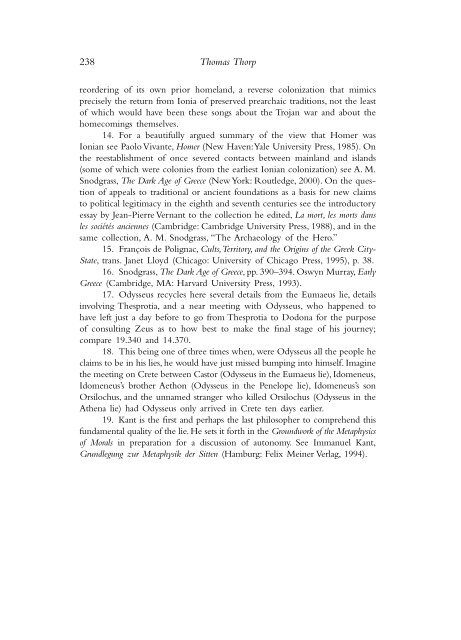Create successful ePaper yourself
Turn your PDF publications into a flip-book with our unique Google optimized e-Paper software.
238 Thomas Thorp<br />
reordering <strong>of</strong> its own prior homeland, a reverse colonization that mimics<br />
precisely <strong>the</strong> return from Ionia <strong>of</strong> preserved prearchaic traditions, not <strong>the</strong> least<br />
<strong>of</strong> which would have been <strong>the</strong>se songs about <strong>the</strong> Trojan war and about <strong>the</strong><br />
homecomings <strong>the</strong>mselves.<br />
14. For a beautifully argued summary <strong>of</strong> <strong>the</strong> view that Homer was<br />
Ionian see Paolo Vivante, Homer (New Haven: Yale University Press, 1985). On<br />
<strong>the</strong> reestablishment <strong>of</strong> once severed contacts between mainland and islands<br />
(some <strong>of</strong> which were colonies from <strong>the</strong> earliest Ionian colonization) see A. M.<br />
Snodgrass, The Dark Age <strong>of</strong> Greece (New York: Routledge, 2000). On <strong>the</strong> question<br />
<strong>of</strong> appeals to traditional or ancient foundations as a basis for new claims<br />
to political legitimacy in <strong>the</strong> eighth and seventh centuries see <strong>the</strong> introductory<br />
essay by Jean-Pierre Vernant to <strong>the</strong> collection he edited, La mort, les morts dans<br />
les sociétés anciennes (Cambridge: Cambridge University Press, 1988), and in <strong>the</strong><br />
same collection, A. M. Snodgrass, “The Archaeology <strong>of</strong> <strong>the</strong> Hero.”<br />
15. François de Polignac, Cults, Territory, and <strong>the</strong> Origins <strong>of</strong> <strong>the</strong> Greek City-<br />
State, trans. Janet Lloyd (Chicago: University <strong>of</strong> Chicago Press, 1995), p. 38.<br />
16. Snodgrass, The Dark Age <strong>of</strong> Greece, pp. 390–394. Oswyn Murray, Early<br />
Greece (Cambridge, MA: Harvard University Press, 1993).<br />
17. Odysseus recycles here several details from <strong>the</strong> Eumaeus lie, details<br />
involving Thesprotia, and a near meeting with Odysseus, who happened to<br />
have left just a day before to go from Thesprotia to Dodona for <strong>the</strong> purpose<br />
<strong>of</strong> consulting Zeus as to how best to make <strong>the</strong> final stage <strong>of</strong> his journey;<br />
compare 19.340 and 14.370.<br />
18. This being one <strong>of</strong> three times when, were Odysseus all <strong>the</strong> people he<br />
claims to be in his lies, he would have just missed bumping into himself. Imagine<br />
<strong>the</strong> meeting on Crete between Castor (Odysseus in <strong>the</strong> Eumaeus lie), Idomeneus,<br />
Idomeneus’s bro<strong>the</strong>r Aethon (Odysseus in <strong>the</strong> Penelope lie), Idomeneus’s son<br />
Orsilochus, and <strong>the</strong> unnamed stranger who killed Orsilochus (Odysseus in <strong>the</strong><br />
A<strong>the</strong>na lie) had Odysseus only arrived in Crete ten days earlier.<br />
19. Kant is <strong>the</strong> first and perhaps <strong>the</strong> last philosopher to comprehend this<br />
fundamental quality <strong>of</strong> <strong>the</strong> lie. He sets it forth in <strong>the</strong> Groundwork <strong>of</strong> <strong>the</strong> Metaphysics<br />
<strong>of</strong> Morals in preparation for a discussion <strong>of</strong> autonomy. See Immanuel Kant,<br />
Grundlegung zur Metaphysik der Sitten (Hamburg: Felix Meiner Verlag, 1994).
















